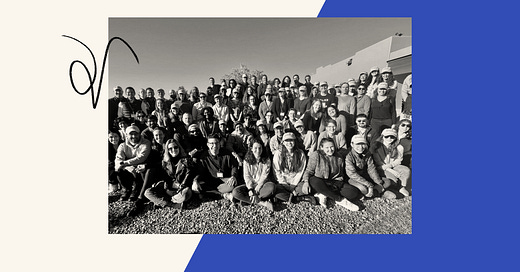
Discover more from If you can keep it
Five lessons from building an anti-authoritarianism nonprofit
How to scale a democracy organization
This week, Ian is a guest on Masters of Scale, the award-winning podcast on entrepreneurship. Listen to the episode here.
The episode talks about a lot of issues — but above all, it covers what we’ve learned in the seven years where Protect Democracy has grown from a scrappy startup to a team of 120+ people in 26 states.
Defeating authoritarianism isn’t just about being on the right side of history. We also have to be organized. We have to build sustainable organizations and coalitions capable of achieving a monumental, generational mission.
So to accompany the episode, the two of us wanted to share the top five things we have learned about building a democracy organization since November 8, 2016.
Culture is the DNA of our (and every) org
When we founded Protect Democracy in the weeks and months after Trump’s election, the first thing we did was to intentionally set our culture. It felt like the world was on fire, but we forced ourselves to just stop. We spent hours envisioning the sort of team and culture we wanted to consciously build.
It was the best strategic decision we’ve ever made. That upfront investment has paid dividends thousands of times over.
You see the same thing across for profit companies and nonprofit organizations — teams, organizations, coalitions and initiatives with strong and intentional cultures tend to thrive and have massive impacts. Those without often struggle with conflicts or roadblocks that have little to do with the work itself.
But the truth is you can’t just speak culture. It isn’t just principles on the wall. You have to weave it into every aspect of the organization and live it, from the top down and with constant reinforcement and practice.
A precise and clear mission is and must be the metric
The pro-democracy field has always had a fundamental challenge: as a movement, we’re fighting for our right to disagree about politics and policy.
On almost any other goal, you can build a movement largely out of people who have the same values and worldviews. Ours isn’t like that. Defeating authoritarianism requires a broad, cross-ideological coalition that may not line up on the same side on any other issue.
That’s why a firm commitment to (and clarity around) mission has been especially important. It’s helped us stay focused on impact and build a diverse team that’s capable of rising to this moment.
If we can’t as a democracy movement bring people together across political differences, how can we expect our country to do it?
Get out of the beltway — but reflect & stay connected
Protect Democracy has no headquarters.
We don’t just mean we’re a remote organization (which we have been since 2017). We mean that none of our offices are, officially or unofficially, the central hub. That’s by design for two reasons.
First, if you want to be a distributed organization, you can’t have a division between everyone at headquarters and everyone else. Otherwise, the people who are remote feel second class, like they’re missing something.
Second, our democracy is so much bigger than Washington, DC. If we’re going to play any role in trying to protect and ultimately strengthen American democracy, we need the wisdom of people from all over the country.
But to make it work, we at Protect Democracy have had to be extra intentional about reflection and connection — harnessing every possible moment for inclusion and shared responsibility in the decision making and culture of the organization. We have multi-day offsites, multiple times a year. We invest resources in getting people face to face in ways that foster deep connection. And we use deliberate moments of reflection and connection — even on the daily video calls that make a nonprofit work — to make up for the things that get lost in cyberspace.
Embrace growth, learning and ‘coopertition’
There’s often an assumption nonprofits should always be cooperative — that we should be coalescing into one shared, lockstep effort.
But that mindset has real costs. Because the truth is, none of us are certain of the best ways to protect our democracy. While it’s true that a successful pro-democracy movement must be cooperative — that goes without saying — we also need to be innovating, experimenting, embracing differences and getting better at what we do each and every day. For that, a little bit of competition can be healthy.
The nonprofit space is still a marketplace where market dynamics can be beneficial, it’s just that instead of delivering higher financial dividends, the firms deliver impact toward specific social challenges.
At Protect Democracy, we’re thrilled when another organization comes up with an innovative, new strategy. Because that pushes us to do better in our work, and then we can turn around and push them back. We call this dynamic “coopertition” — cooperating, sharing learning and staying coordinated while harnessing the power of healthy competition to drive more impact.
Find the hope
Authoritarianism thrives on despair. Hopelessness, isolation and a feeling that nothing can possibly get better — that’s how we lose our democracy.
Some days we feel that hopelessness, that sense that the odds in this country are tipping towards authoritarianism. But to find the hope again, we don’t have to convince ourselves that’s wrong, that it’s all going to be fine — we just have to remind each other that we all have the power to tip the odds back in favor of democracy. Because we do.
Democracy, as a form of government, isn’t just a set of laws. As De Tocqueville described, it’s the “habits of the heart” that we carry with us each day, the belief that we have the agency to chart our own future.
And so even in a moment when it feels like we are trending towards a dark place, the truth is that we, together, can still shape the future. That is what gives us hope.
—
Again, listen to the episode here and we’d be grateful if you’d rate and review it. We would love to know your thoughts.









